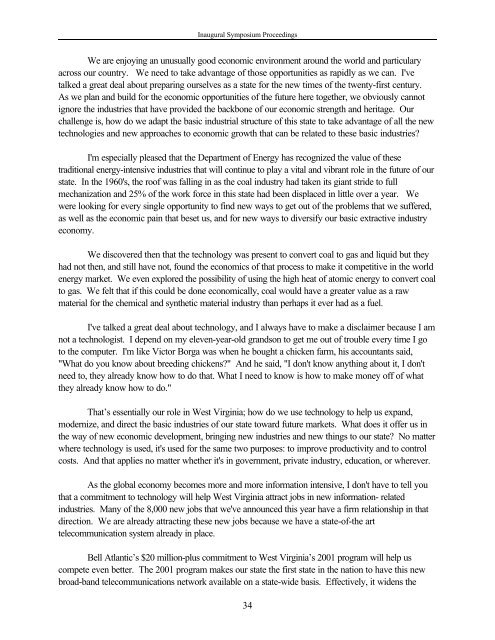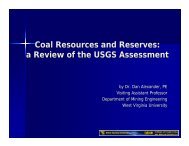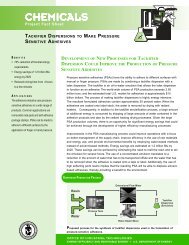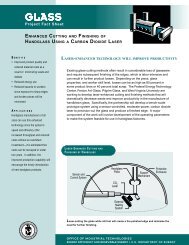PROCEEDINGS - Industries of the Future - West Virginia - West ...
PROCEEDINGS - Industries of the Future - West Virginia - West ...
PROCEEDINGS - Industries of the Future - West Virginia - West ...
You also want an ePaper? Increase the reach of your titles
YUMPU automatically turns print PDFs into web optimized ePapers that Google loves.
Inaugural Symposium Proceedings<br />
We are enjoying an unusually good economic environment around <strong>the</strong> world and particulary<br />
across our country. We need to take advantage <strong>of</strong> those opportunities as rapidly as we can. I've<br />
talked a great deal about preparing ourselves as a state for <strong>the</strong> new times <strong>of</strong> <strong>the</strong> twenty-first century.<br />
As we plan and build for <strong>the</strong> economic opportunities <strong>of</strong> <strong>the</strong> future here toge<strong>the</strong>r, we obviously cannot<br />
ignore <strong>the</strong> industries that have provided <strong>the</strong> backbone <strong>of</strong> our economic strength and heritage. Our<br />
challenge is, how do we adapt <strong>the</strong> basic industrial structure <strong>of</strong> this state to take advantage <strong>of</strong> all <strong>the</strong> new<br />
technologies and new approaches to economic growth that can be related to <strong>the</strong>se basic industries?<br />
I'm especially pleased that <strong>the</strong> Department <strong>of</strong> Energy has recognized <strong>the</strong> value <strong>of</strong> <strong>the</strong>se<br />
traditional energy-intensive industries that will continue to play a vital and vibrant role in <strong>the</strong> future <strong>of</strong> our<br />
state. In <strong>the</strong> 1960's, <strong>the</strong> ro<strong>of</strong> was falling in as <strong>the</strong> coal industry had taken its giant stride to full<br />
mechanization and 25% <strong>of</strong> <strong>the</strong> work force in this state had been displaced in little over a year. We<br />
were looking for every single opportunity to find new ways to get out <strong>of</strong> <strong>the</strong> problems that we suffered,<br />
as well as <strong>the</strong> economic pain that beset us, and for new ways to diversify our basic extractive industry<br />
economy.<br />
We discovered <strong>the</strong>n that <strong>the</strong> technology was present to convert coal to gas and liquid but <strong>the</strong>y<br />
had not <strong>the</strong>n, and still have not, found <strong>the</strong> economics <strong>of</strong> that process to make it competitive in <strong>the</strong> world<br />
energy market. We even explored <strong>the</strong> possibility <strong>of</strong> using <strong>the</strong> high heat <strong>of</strong> atomic energy to convert coal<br />
to gas. We felt that if this could be done economically, coal would have a greater value as a raw<br />
material for <strong>the</strong> chemical and syn<strong>the</strong>tic material industry than perhaps it ever had as a fuel.<br />
I've talked a great deal about technology, and I always have to make a disclaimer because I am<br />
not a technologist. I depend on my eleven-year-old grandson to get me out <strong>of</strong> trouble every time I go<br />
to <strong>the</strong> computer. I'm like Victor Borga was when he bought a chicken farm, his accountants said,<br />
"What do you know about breeding chickens?" And he said, "I don't know anything about it, I don't<br />
need to, <strong>the</strong>y already know how to do that. What I need to know is how to make money <strong>of</strong>f <strong>of</strong> what<br />
<strong>the</strong>y already know how to do."<br />
That’s essentially our role in <strong>West</strong> <strong>Virginia</strong>; how do we use technology to help us expand,<br />
modernize, and direct <strong>the</strong> basic industries <strong>of</strong> our state toward future markets. What does it <strong>of</strong>fer us in<br />
<strong>the</strong> way <strong>of</strong> new economic development, bringing new industries and new things to our state? No matter<br />
where technology is used, it's used for <strong>the</strong> same two purposes: to improve productivity and to control<br />
costs. And that applies no matter whe<strong>the</strong>r it's in government, private industry, education, or wherever.<br />
As <strong>the</strong> global economy becomes more and more information intensive, I don't have to tell you<br />
that a commitment to technology will help <strong>West</strong> <strong>Virginia</strong> attract jobs in new information- related<br />
industries. Many <strong>of</strong> <strong>the</strong> 8,000 new jobs that we've announced this year have a firm relationship in that<br />
direction. We are already attracting <strong>the</strong>se new jobs because we have a state-<strong>of</strong>-<strong>the</strong> art<br />
telecommunication system already in place.<br />
Bell Atlantic’s $20 million-plus commitment to <strong>West</strong> <strong>Virginia</strong>’s 2001 program will help us<br />
compete even better. The 2001 program makes our state <strong>the</strong> first state in <strong>the</strong> nation to have this new<br />
broad-band telecommunications network available on a state-wide basis. Effectively, it widens <strong>the</strong><br />
34






